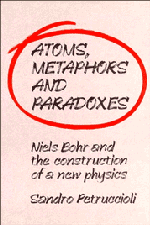Book contents
- Frontmatter
- Contents
- Introduction
- 1 The paradigm of complementarity
- 2 Atomic model and quantum hypotheses
- 3 The principle of correspondence
- 4 The theory of virtual oscillators
- 5 The conceptual foundation of quantum mechanics
- 6 The Bohr—Einstein confrontation: phenomena and physical reality
- General bibliography
- Name index
- General index
Introduction
Published online by Cambridge University Press: 10 November 2009
- Frontmatter
- Contents
- Introduction
- 1 The paradigm of complementarity
- 2 Atomic model and quantum hypotheses
- 3 The principle of correspondence
- 4 The theory of virtual oscillators
- 5 The conceptual foundation of quantum mechanics
- 6 The Bohr—Einstein confrontation: phenomena and physical reality
- General bibliography
- Name index
- General index
Summary
‘Quantum mechanics is very impressive. But an inner voice tells me that it is not yet the real thing. The theory produces a good deal but hardly brings us closer to the secret of the Old One’. These views were contained in a letter written by Albert Einstein to Max Born in December 1926. Though the following year would see the completion of work on the theoretical foundation of the modern physics of atoms and particles, Einstein was never to change his judgement and remained firmly convinced that ‘this business […] contains some unreasonableness’. He was unwilling to sacrifice his own ideas as to the cognitive scope of science even in the face of the important results being achieved by the new theory. To the undeterministic findings of quantum mechanics he opposed his belief in the ‘possibility of giving a model of reality, a theory, that is to say, which shall represent events themselves and not merely the probability of their occurrence’. For this reason he chose to live with the isolation of his scepticism and dissent, ironically accepting the reputation as a obstinate heretic that he had won over the years among his colleagues, and worked to the end on his own research programme to develop a unified field theory of rigorously causal nature.
As is generally known, Einstein carried on a strong scientific and philosophical dispute with the defenders of the so-called official interpretation of quantum mechanics.
- Type
- Chapter
- Information
- Atoms, Metaphors and ParadoxesNiels Bohr and the Construction of a New Physics, pp. 1 - 9Publisher: Cambridge University PressPrint publication year: 1993



